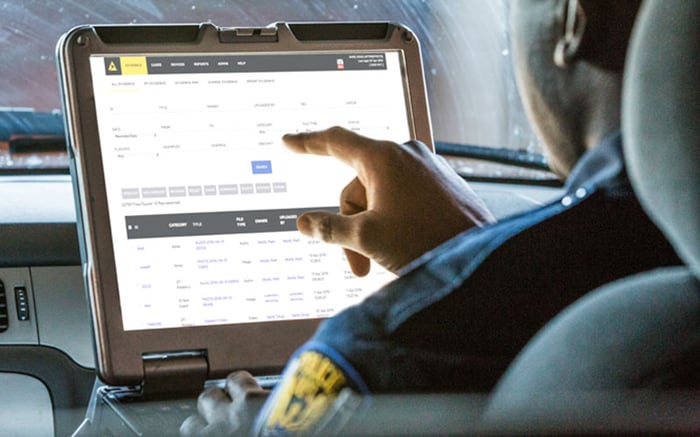The threat of new competition is causing Axon Enterprise's (AXON 0.28%) stock to retreat, even as sales and profits expand.
Fourth-quarter earnings exceeded analyst expectations, and the law enforcement equipment and services provider continues to add more customers. Yet shares are well off their all-time high since Motorola Solutions entered Axon's key markets with a suite of affordable products bundled into a video-as-a-service (VaaS) package, representing the first viable challenge Axon has faced in years.
Bigger, better financed, and boasting at least as much credibility with police agencies around the world, Motorola presents investors with an interesting dilemma: Is the 35% haircut to Axon stock enough of a discount, or will Axon lose more ground, both on the stock market and in the marketplace?

Image source: Axon Enterprise.
A stunning achievement
Axon's portfolio of products and services is comprehensive and constantly evolving, and the company has proven itself invaluable to law enforcement agencies at all levels of government both in the U.S. and around the world. Its Taser conducted electrical weapon (CEW) is the premiere less-than-lethal tool on officers' duty belts today, and despite Axon's expansion into new verticals, the stun gun remains its biggest revenue generator.
Tasers account for 54% of Axon's annual total revenue, but its latest cloud-connected Taser 7 model has been especially popular. Sales jumped 62% in the fourth quarter and pushed the segment to represent 60% of total revenue for the period after the next-gen CEW notched its largest contract win ever with a record $20 million order. Yet its body camera and evidence management business also saw a 37% gain in quarterly sales as well.
That allowed Axon to increase its guidance for the coming year, with revenue expected to grow another 12% in the first quarter.
More a technology company
Yet the problem is that Motorola isn't standing still, either. It also is looking for new markets to conquer in law enforcement, and is introducing artificial intelligence and advanced analytics to real-time crime centers, as well as establishing partnerships between public safety agencies and businesses to reduce crime.
A program called Starlight, for example, initiated in Dallas in 2019, uses Motorola's AI technology to alert local police of potential crimes in progress at stores where its Avigilon cameras are installed. Crime has dropped 35% in previously high-crime establishments, and there's been a 40% reduction in police calls for service.
Axon, of course, has its own AI technology center, so it's not lagging in that department -- and it, too, is increasing its technological footprint. A new drone service that integrates air surveillance into its evidence management and command center options shows Axon is becoming a software-as-a-service powerhouse in its own right. But it is facing challenges across multiple fronts, something it really hasn't experienced before.
Yet even as Axon faces new competition, its own business is still solid and growing across multiple fronts. Just as it may be difficult for Axon to break into the command center market, Motorola could find it difficult to get into body cameras. Axon's ecosystem, which is in virtually every major city's police department, is incredibly sticky, and switching to a new provider may not be easily achieved.
The overall market is also expanding. Calls for police accountability have never been greater, so even with a well-financed competitor entering the market, the total addressable market is growing.
Worth the price
While Axon's stock looks pricey, even after lopping off more than a third of its value, there is a reason this growth stock was trading at a premium. It holds pricing power in the market, it's synonymous with less-than-lethal weapons, and it has an established reputation with solid body cameras and digital evidence management that should enable it to keep ramping up growth.
Motorola could be a tough competitor, especially if it acquires a smaller rival in Axon's sweet spot. Digital Ally has long been a thorn in Axon's side on patent issues, and rival stun gun maker Phazzer is back from bankruptcy. Acquisitions of small challengers like that could round out Motorola's offerings, and confront Axon on even more battlefields.
However, until we see proof Motorola can actually steal big contract wins from Axon, I think the Taser maker is a buy at this price.





